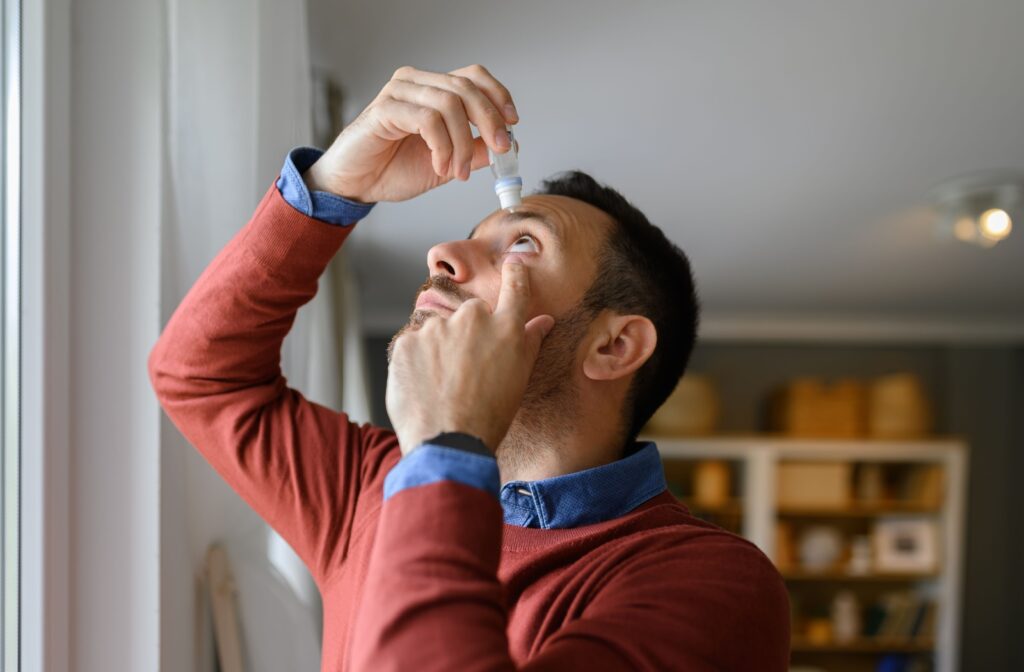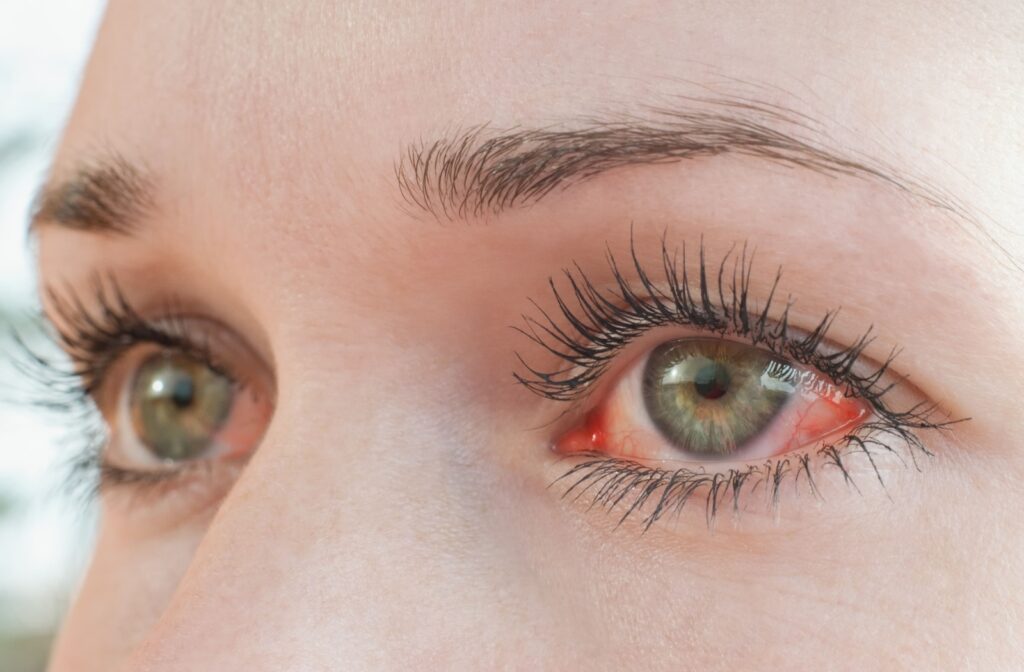Conjunctivitis, commonly known as pink eye, is a highly contagious eye infection that can cause discomfort and irritation. While it may seem like a minor issue, it’s important to understand the transmission of conjunctivitis and take preventive measures to avoid its spread.
Viral conjunctivitis can survive on surfaces for up to 2 weeks, making good hygiene practices and timely management of symptoms by visiting your eye doctor crucial to avoid spread.
What Is Conjunctivitis?
Conjunctivitis is an inflammation of the conjunctiva, the thin transparent layer of tissue that lines the whites of the eye and the inside of the eyelid. Symptoms of conjunctivitis include swelling of the conjunctiva or inner eyelid, making the blood vessels more visible, and the appearance of pink or red eyes. Other symptoms can include:
- Itching or irritation
- Burning eyes
- A discharge such as pus or mucus
- Watery eyes
- Foreign body sensation
Types of Conjunctivitis
There are several types of conjunctivitis based on the cause, including:
- Viral conjunctivitis: Caused by viruses such as the ones that cause the common cold and upper respiratory tract infections. This type is highly contagious.
- Bacterial conjunctivitis: Caused by bacteria from poor hand hygiene, or contaminated face makeup or face lotions. This type is contagious and can infect the other eye.
- Allergic conjunctivitis: This type is triggered by allergens or irritants and isn’t contagious.
- Chemical conjunctivitis: Caused by irritation or inflammation from makeup, air pollution, chlorine in pools, or other toxic chemicals.
Diagnosing Conjunctivitis
Diagnosing conjunctivitis can be done through a comprehensive eye exam by an eye doctor. The type of conjunctivitis can also be determined by additional tests such as testing the drainage or discharge.
It’s crucial to get an accurate diagnosis to receive the appropriate treatment and prevent the spread of conjunctivitis to others.

Treatment for Conjunctivitis
Your eye doctor will determine the treatment based on the cause and type of pink eye. Treatment for conjunctivitis can include:
- Antibiotic drops or ointments
- Antiviral eye drops or pills
- Allergy eye drops
- Artificial tears
Transmission of Conjunctivitis
Since viral conjunctivitis is very contagious, knowing how it transmits can help you avoid it. Here’s how conjunctivitis can spread:
- Direct contact, such as coughing or sneezing, with someone who is infected.
- Touching surfaces contaminated by someone who is infected.
- Sharing personal items with someone infected, such as towels, makeup, or contact lenses.
Understanding these transmission pathways helps you take steps to protect yourself and others from getting pink eye.
Lifespan of Conjunctivitis on Surfaces
The lifespan of conjunctivitis-causing pathogens on surfaces can vary:
- Viruses: They can live on surfaces for up to 2 weeks. Some viruses can last up to 8 weeks.
- Bacteria: Most of these aren’t able to survive after 2 to 8 hours. However, some can last for 2 days or more.
- Allergens: Since allergic conjunctivitis isn’t contagious, you don’t have to worry about it living on surfaces.
Understanding these durations can help you know how long to be cautious and diligent about proper cleaning.
Preventing the Spread of Conjunctivitis
Conjunctivitis can remain contagious for 10 to 14 days. Small changes in daily habits can make a big difference in preventing the spread of pink eye. These can include:
- Frequent handwashing: Wash your hands often with soap and water for at least 20 seconds. If you don’t have access to soap, use hand sanitizer.
- Avoid touching your face: Don’t touch your eyes, especially with unclean hands.
- Don’t share personal items: Avoid sharing towels, makeup, or other items that come into contact with your face.
- Don’t reuse items: Don’t reuse tissues or towels on your face.
- Follow your eye doctor’s instructions: Maintain proper eye hygiene and contact lens care.
Cleaning & Disinfecting Guidelines
Keeping your environment clean can drastically reduce the spread of pink eye. To keep conjunctivitis from spreading, follow these cleaning tips:
- Use disinfectants: Clean surfaces with disinfectants that are effective against viruses and bacteria.
- Focus on high-touch areas: Disinfect doorknobs, light switches, and frequently touched surfaces.
- Wash linens regularly: Wash pillowcases, sheets, and towels in hot water to kill any lingering bacteria or viruses.
When to Seek Medical Attention
While conjunctivitis doesn’t have long-term complications, sometimes, it requires professional medical care. If you suspect you have pink eye, it’s always a good idea to consult your eye doctor for proper treatment. Here are some signs when to see your eye doctor:
- Persistent symptoms: If your symptoms, such as eye redness, don’t improve.
- Severe discharge: If you notice a significant amount of discharge, especially if it’s green or yellow.
- Vision changes: Blurred vision or sensitivity to light warrants immediate medical attention.
Management of Conjunctivitis
Conjunctivitis can cause eye discomfort, but understanding its transmission and lifespan on surfaces can help prevent its spread. Remember to practice good hygiene, clean your environment, and seek medical attention when necessary.
If you suspect you have pink eye or notice changes in your vision, book an appointment with Total Vision Long Beach for a proper diagnosis and the care and treatment you need.



